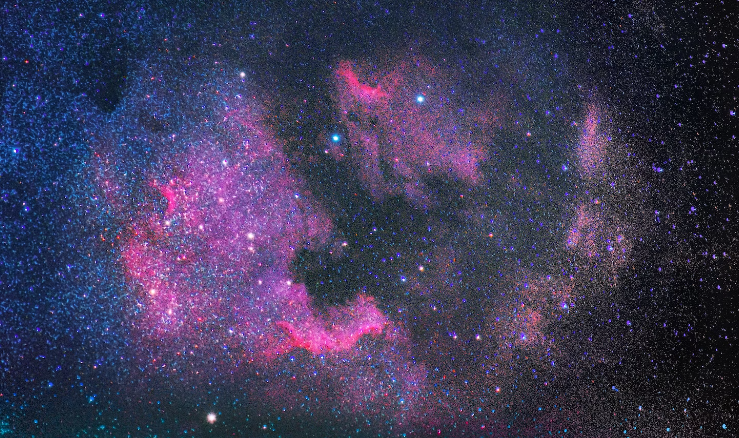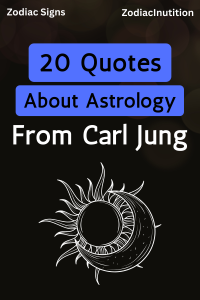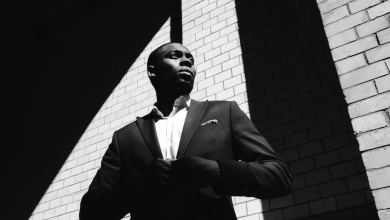20 Quotes About Astrology From Carl Jung

Carl Gustav Jung was a well-known Swiss psychiatrist and psychoanalyst known for his work in the field of depth psychology and analytical psychology. Although Jung himself was not directly involved in astrology, he had some interesting views on the subject and the connection between psychology and astrology.
20 quotes about astrology
Droste effect background. Abstract design for concepts related to astrology and fantasy.
1. We are born at a particular time and place, and like a vintage of wine, we have the characteristics of the year and season in which we are born. Astrology makes no claim to anything more.
2. Astrology is one of the intuitive methods such as the I Ching, geomancy, and other divinatory methods. It is based on the principle of synchronicity, ie meaningful coincidence. … Astrology is a naively projected psychology in which the various attitudes and temperaments of humans are represented as gods and identified with planets and zodiac constellations.
3. I dare say that one day we will discover in astrology a whole lot of knowledge that has been intuitively projected into the sky. So it seems that the signs of the zodiac are character images, i.e. libido symbols that represent the typical characteristics of the libido at a certain point in time. – CG Jung in a letter to Sigmund Freud, June 12, 1911
4. There is another idea in astrology that is a little scary and is therefore particularly hated by scientists. You remember I told you that the birth dates of important men cluster around the three points of the air trine. If this were confirmed, we could go further and compile statistics on suicides, insanity, epilepsy, etc. This could lead to tangible results and then astrology would be a very serious matter. I suggested to astrologers that we should make more scientific statements.
Jung viewed astrology as an aspect of archetypal symbolism, reflecting humanity’s collective ideas and archetypal patterns.
He recognized the importance of symbols and myths in human consciousness and emphasized that astrology could be viewed as a system of symbols that can provide insights into the subconscious and deep psychological structures of the individual.
5. For example, many people assume that astrology is just nonsense. It’s true that astrology has nothing to do with the stars. The horoscope says that you were born in Taurus, but today the constellations have shifted and the horoscopes no longer correspond to the actual positions of the stars. …But people criticize astrology as if it had anything to do with the stars.
6. The star vault of the sky is in reality the open book of cosmic projection, which is reflected in the mythologies, i.e. the archetypes. In this vision, astrology and alchemy, the two classic functions of the psychology of the collective unconscious, join hands.
7. Astrology is of particular interest to the psychologist because it contains a kind of psychological experience which we call projected – that is, we find the psychological facts as they were in the constellations. This originally gave rise to the idea that these factors originate from the stars while merely being in a relationship of synchronicity with them. I admit that this is a very strange fact, which throws a peculiar light on the structure of the human mind. – Carl G. Jung in 1947 in a letter to Prof. BV Raman
8. Insofar as personality is still potential, it may be called transcendent, and insofar as it is unconscious, it is indistinguishable from all the things which bear its projections… [i.e.] symbols of the external world and the cosmic symbols. These form the psychological basis for the conception of man as a macrocosm through the astrological components of his character.
Jung was interested in the common symbols and motifs that appear in the dreams, fantasies and myths of people from different cultures.
He believed that, like fairy tales and myths, astrology contained archetypal symbols and patterns that were rooted in a kind of “collective unconscious” and could therefore influence individual behavior and personality development.
9. The astrologers are influenced by theosophy and say: “It’s very simple, it’s just a vibration!”… But what is vibration? They say it’s light energy, maybe electricity, but they’re not entirely informed. In any case, the vibrations that could affect us have never been seen, so it remains just a word.
10. Our modern science begins with astronomy. Instead of saying that man was guided by psychological motives, it used to be said that he was guided by his stars. …The puzzling thing is that there really is a strange correspondence between astrological and psychological facts, so that one can isolate time from the characteristics of an individual, and also that one can derive characteristics from a particular time. From this, we must conclude that what we call psychological motives are in some sense identical to the star positions. Since we cannot prove this, we must make a special hypothesis. This hypothesis states that the dynamics of our psyche is not only identical to the position of the stars and has nothing to do with vibrations – this is an inadmissible hypothesis. It is better to assume that I am a phenomenon of time. …The stars are simply used by humans as indicators of time.
When it came to individual astrology, Jung was cautious.
He emphasized that the interpretation of astrological constellations should not be understood as rigid predictions, but rather as indications of personal tendencies and potential. He believed that individual personality and development was influenced by a variety of factors, including astrological influences.
11. The collective unconscious … seems to consist of mythological motifs or archetypes, which is why the myths of all peoples are its real exponents. In fact, one could view the entire mythology as a kind of projection of the collective unconscious. This becomes most clear when looking at the celestial constellations, whose originally chaotic forms are organized through the projection of images. This explains the influence of the stars as claimed by astrologers. These influences are nothing more than unconscious, introspective perceptions of the collective unconscious.
12. Synchronicity does not allow causality in the analogy between earthly events and astrological constellations… What astrology can determine are the analogous events, but not that one series is the cause or effect of the other. (For example, the same constellation can mean a catastrophe at one time and, in the same case, a cold in the head at another time). … In any case, astrology occupies a unique and special position among intuitive methods. … I have observed many cases where a clearly defined psychological phase or similar event was accompanied by a transit (particularly when Saturn and Uranus were affected).
13. It is obvious that astrology has much to offer psychology, but what astrology can offer its older sister is less obvious. As far as I can tell, it seems to me that it is beneficial for astrology to take into account the existence of psychology, especially the psychology of personality and the unconscious.
What did Jung write about astrology in his letters and essays?
14. It is indeed very difficult to explain the astrological phenomenon. I’m not the least bit interested in an either/or explanation. I always say that when it comes to a psychological explanation there is only one alternative: either and or! This seems to me to be the case with astrology too. – Carl G. Jung in a letter to Hans Bender, April 10, 1958, Carl G. Jung Letters, Volume 2, 1951-1961, p. 428.
15. The truth is that astrology is thriving like never before. There is a veritable library of astrology books and magazines that outsell the best scientific works. The number of Europeans and Americans who have horoscopes drawn is not in the hundreds of thousands, but in the millions. Astrology is a thriving industry. … If such a large percentage of the population has an insatiable need for this counterpoint to the scientific spirit, we can be sure that the collective psyche in every individual – no matter how unscientific – has this psychological need in equal measure. A certain kind of “scientific” skepticism and criticism in our time is nothing more than an inappropriate compensation for the powerful and deeply rooted superstitious impulses of the collective psyche. – CG Jung, Two essays on analytical psychology
16. The important point is that the horoscope is true only in the temporal sense, not in the astronomical sense. It is independent of the stars. We see that menstruation has a lunar period, but it does not coincide with the phases of the moon, otherwise all women would menstruate at the same time, and they don’t. It simply means that there is a lunar law in every woman and also the laws of the stars in every person, but not in the relationship of cause and effect. – CG Jung, December 11, 1929
Jung occasionally wrote about astrology in his works to explore the possible meaning and interpretation of archetypal symbolism.
Human holding a mobile with a zodiac wheel hologram and mandala. The Milky way and Life Graph Background. Copyspace.
However, he also emphasized that individual development and self-knowledge should not be based solely on astrological interpretations, but on a more comprehensive understanding of one’s own subconscious and personality.
17. While studying astrology, I have applied it many times to concrete cases. …The experiment suggests a versatile mind, is unreliable in the hands of an unimaginative person, and dangerous in the hands of a fool, as intuitive methods always are. If used intelligently, the experiment is useful when dealing with an opaque structure. It often provides surprising insights. The clearest limitation of the experiment is the observer’s lack of intelligence and taciturnity.
… Undoubtedly, astrology is flourishing today as never before in the past, but it is still very unsatisfactorily researched, although it is very widely used. It is only a suitable tool if used intelligently. It is by no means foolproof, and when used by a rationalistic and narrow-minded mind, it is a definite nuisance. – CG Jung: Letters, Volume 2, 1951-1961, pages 463-464, letter to Robert L. Kroon, November 15, 1958
18. Astrology is knocking on the doors of our universities: A professor in Tübingen has turned to astrology, and a course on astrology was held at Cardiff University last year. Astrology is not mere superstition, but contains some psychological facts (like theosophy) that are of considerable importance. Astrology actually has nothing to do with the stars, but is the 5000 year old psychology of antiquity and the Middle Ages. – CG Jung in a letter to L. Oswald on December 8, 1928, in Carl G. Jung, Letters, Vol. 1, 1973
19. Astrology would be a large-scale example of synchronism if it had thoroughly tested findings. But at least there are some sufficiently tested facts, supported by a wealth of statistics, that make the astrological problem even worthy of philosophical study. It is assured of recognition by psychology without any further restrictions because astrology represents the sum of all psychological knowledge of antiquity.
Final Thoughts
20. The fact that it is possible to reconstruct a person’s character quite accurately from his birth dates shows the relative validity of astrology. However, it should be borne in mind that the dates of birth do not depend in any way on the actual astronomical constellations. But based on an arbitrary, purely conceptual time system. Due to the precession of the equinoxes, the vernal equinox has long since moved from the constellation Aries to Pisces, so that the astrological zodiac according to which the horoscopes are calculated no longer corresponds to the celestial one.
If there are astrological character diagnoses that actually apply, then it is not due to the influence of the stars, but rather to our own hypothetical qualities of time. In other words, whatever is born or done at that particular point in time has the quality of that point in time.
Overall, Carl Gustav Jung viewed astrology as an aspect of human culture and the collective unconscious that can provide insights into the deep psychological layers of humans. Although he did not advocate astrological predictions, he saw value in exploring archetypal symbolism and its possible significance for individual development.




